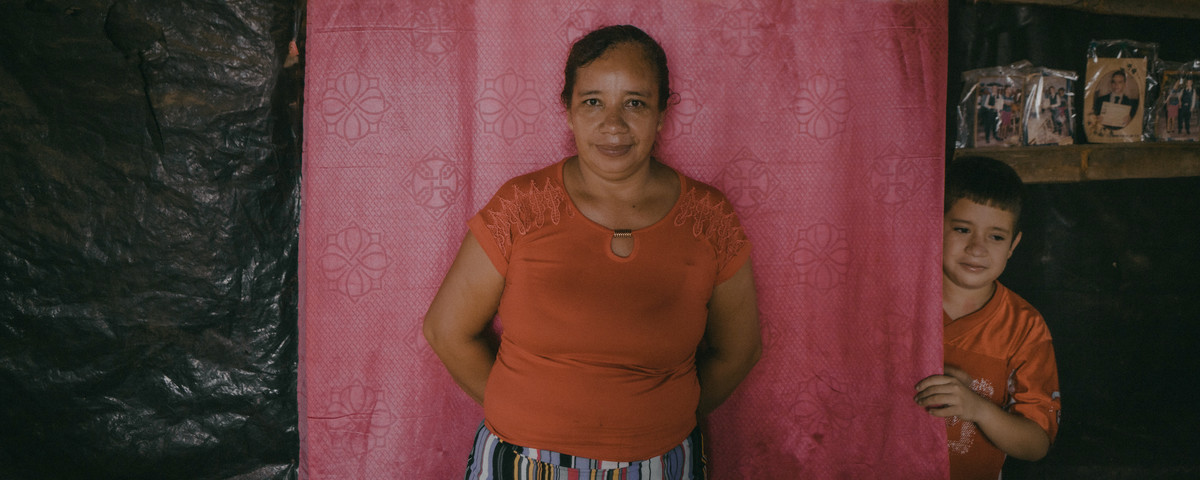Ana’s Choice: Eggs or Rice
For the past year, Ana’s family has had to cut back even more than usual on the food they buy. If they buy rice, they don’t buy eggs, and vice versa.

Ana Isabel Salgado’s husband earns between $6 and $7 a day plowing and planting other people’s land. Her son, also a farmer, is paid the same. Every week, the money they earn disappears the minute they get paid. “In this house, we don’t even see money,” says Ana Isabel, who has lived her whole life in the canton of El Corozal, one of many rural communities in the municipality of Berlín that suffer extreme levels of poverty, and no potable water.
Her house, which is surrounded by fruit trees and sided with metal sheeting that refracts the blinding midday sun, sits on a hill, contrasting sharply against the dusty yellow earth that surrounds it. Ana Isabel lives here with her husband, José Martínez, and their four children, ages 27, 23, 18 and nine.
Their work calendar is divided into two categories of activities —two seasons— that they commit to like a religion: For six months, they work for money, and for the other six months, they farm their own food. From May to November, the family plows and plants and harvests, but the work is not for pay. Ana Isabel is in charge of rationing the food they harvest and managing what little money comes during the farming season, which is never more than $100 a month. The trees around her house produce cashews, jocote fruit, and mangos. When there’s a cashew harvest, there’s more money: Ana sells the nuts to a buyer who drives by her house in a pick-up truck once a week. He pays her $20 a bucket.
Many families in El Salvador, including Ana Isabel’s, find it hard to keep track of their basic salary, because it changes all the time. Sometimes —before— Ana was able to buy eggs, sugar, salt, oil, and rice that she would use to supplement her family’s core diet of beans and corn, which they grow themselves. But, about a year ago, they started scaling back the food they bought, because their income couldn’t keep up with the rising cost of food.
In May 2023, when she spoke with El Faro, the year-over-year food price inflation rate in El Salvador was 8.35%, and in the past three years, more than 210,000 people have fallen into extreme poverty. Like Ana Isabel and her family, almost one million Salvadorans now face critical or emergency levels of food insecurity: they do not eat enough, can go days without eating anything, and do not know whether they will have food in the immediate future. They are on the verge of starvation.
When Ana Isabel’s family buys rice, they don’t buy eggs, and vice versa. When they have rice, they eat rice soup with hoja de mora, a wildcrafted leafy green, or rice with beans and tortillas. Their diet does not vary, unless they have eggs, which they also eat with beans and tortillas.
“Today, we’ll use up the little bit of rice we have left,” Ana says, holding out a small handful of rice — what remains of the 25-pound bag she and others in the community received as a donation from a nonprofit a few months ago. The family doesn’t have enough to buy meat, let alone milk. “The last time I ate chicken was at a party I went to a few months ago,” she says.
More than not having money, what Ana and her family worry about the most is losing their crops: either because it rains too little or because it rains too much. When Hurricane Julia hit, they managed to save enough to feed themselves, but lost what they could have sold. In two months, the reserve they have now will run out. When that happens, the family will have to rely on whatever jobs they can find. They will plow and plant other people’s land for $6 or $7 dollars a day, then spend it all on food, then plow and plant other people’s land again the next day.
| Reporting: | Julia Gavarrete |
| Photography: | Víctor Peña and Carlos Barrera |
| Translation: | Max Granger |
| Web design: | Daniel Reyes, Daniel Bonilla, and Alex Santos |
| English edition: | Roman Gressier and José Luis Sanz |